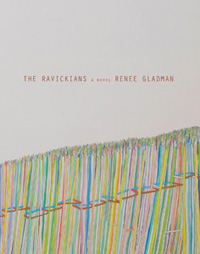Another way to generate text #3: “dictionary expansions”
Teaser Trailer for You Private Person by Richard Chiem
Directed by Meggie Green
Words by Richard Chiem
Music by Kale Ogle
YOU PRIVATE PERSON, Chiem’s first collection of short stories, is forthcoming from Scrambler Books (2012).
Tao Lin’s ‘not trying’ period on Twitter

If you haven’t caught Tao Lin on twitter since his declaration of “no longer trying” during the last ~48 hours, it’s been pretty fun/funny/interesting. Besides watching his unflagging dedication to the whim during the migration of hundreds of followers following the often several times a minute posts re: boredom, racism, music, being unfollowed, retweets forming a “Best American Tweets” anthology (during which I received ~45 notification emails), I think my favorite part so far was when he had “cybersex” with some dude from some band. It’s all getting deleted June 1st. Have you been watching?
A Voice of Leaving: Renee Gladman’s The Ravickians
 The Ravickians
The Ravickians
by Renee Gladman
Dorothy Project, 2011
168 pages / $16 Buy from Dorothy Project or SPD
The second volume of a trilogy of novels exploring the crumbling, war-torn imaginary country of Ravicka, The Ravickians is less an exploration of the people and culture of Ravicka than it is a breathtaking book-length meditation on loss. The book moves through what it means to be lost, to get lost, to lose connection with your fellow humans and surroundings. This is all done in a brief novel divided into three parts: 1) a first person account of a day spent wandering by The Great Ravickian Novelist Luswege Amini; 2) a poetry reading that same day given by Amini friend Zäoter Limici; and 3) 52 pages in twelve sections of unascribed dialogue spoken during a night out in the broken down capitol city of Ravicka that includes Amini, Limici, other writer colleagues and some new characters not mentioned earlier in the text.
May 21st, 2012 / 12:00 pm
Viktor Shklovsky wants to make you a better writer, part 1: device & defamiliarization
When I was finishing up my Master’s degree at ISU, I worried that I still didn’t know much about writing—like, how to actually do it. My mentor Curtis White told me, “Just read Viktor Shklovsky; it’s all in there.” So I moved to Thailand and spent the next two years poring over Theory of Prose. When I returned to the US in the summer of 2005, I sat down and started really writing.
I’ve already put up one post about what, specifically I learned from Theory of Prose, but it occurs to me now that I can be even more specific. So this will be the first in a series of posts in which I try to boil ToP down into a kind of “notes on craft,” as well as reiterate some of the more theoretical arguments that I’ve been making both here and at Big Other over the past 2+ years. Of course if this interests you, then I most fervently recommend that you actually read the Shklovsky—and not just ToP but his other critical texts as well as his fiction, which is marvelous. (Indeed, Curt has since told me that he didn’t mean for me to focus so much on ToP! But I still find it extraordinarily useful.)
Let’s talk first about where Viktor Shklovsky himself started: the concepts of device and defamiliarization.
Five Works of Theory You Should Consider Reading
It always surprises me when creative people admit they don’t enjoy reading theory. Aside from the bountiful inspiration of ideas it provides, certain theoretical works can also inspire formal techniques. For proof, check out E.M. Cioran’s approach to the philosophical prose poem in something like The Temptation to Exist or A Short History of Decay
. Or check out Luce Irigaray’s lyricism in This Sex Which Is Not One
. Tons of other examples abound, from Baudrillard’s fragments to Benjamin’s montages, Blanchot’s récits to Bataille’s grotesques.
Part of the aversion to theory, as far as I can tell, comes from the mistaken assumption that the genre we call theory should be read differently than the genres we call fiction or poetry, because it’s “critical” rather than “creative.” On the contrary, I think it’s quite productive to read theory as if it were poetry or fiction, which is to say as if its primary function was to affect rather than educate.
I recognize that my position is contentious. I’ve taken heat in the past for advising people to suspend their desire for comprehension while reading theory. For reasons unknown, some readers still think understanding a text is important. I’m not one of those people. I read theory and fiction and poetry to experience, to consider, to become other, to shift, to mutate, to change. I most certainly do not read those things to understand them.
What follows are five works that lend themselves to a reading strategy conducive to works of fiction or poetry. Granted, between poetry and fiction a demarcation is said to exist, and granted some read the one different than the other, and granted different styles within different genres require different heuristics, I think readers would benefit from considering the following works as “creative” rather than merely “critical.”
R.I.P. Carlos Fuentes. I just found out. He was one of the greats. Places to start if you haven’t read him: Where the Air Is Clear (1958), The Death of Artemio Cruz (1962), Terra Nostra (1975). & here he is on the BBC (audio), and here are various YouTube videos.
Godspeed, good sir.



